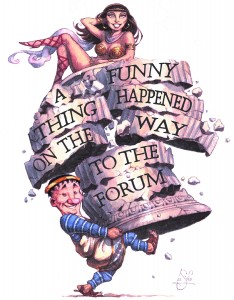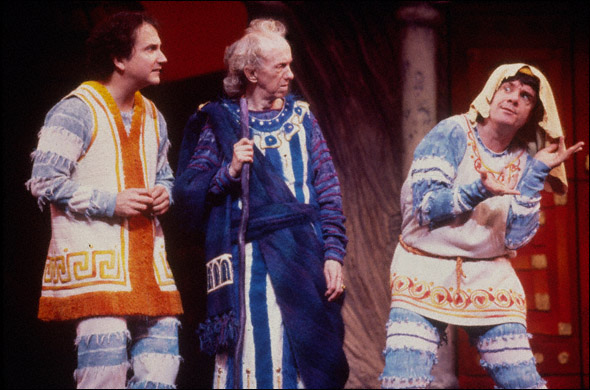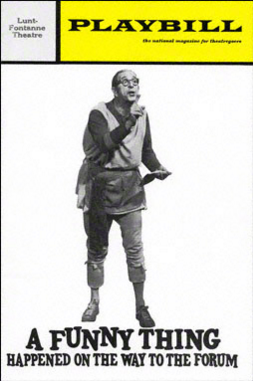Filichia Features: When Funny Thing Was Starting Out
Filichia Features: When Funny Thing Was Starting Out

That production I mentioned last week of A Funny Thing Happened On The Way To The Forum made me return to its roots – meaning the demo.
Do you know the term “demo”? It’s short for “demonstration record.” For musical theater purposes, it’s meant to demonstrate the score of an upcoming show for both would-be backers and recording artists who might take to a tune and record it.
Some demos are elaborately produced with singers and orchestras, while others just have the composer playing the piano while the lyricist sings. Sometimes, of course, the composer and lyricist are one and the same and does double duty.
The Funny Thing demo fits into the last category, which is even better, for the man who provided the words, music and voice to this recording was no less than Stephen Sondheim. True, as a singer – well, don’t quit your day job, Steve – but he knows where the jokes are and how to stress them.
Sondheim recorded this on Nov. 6, 1961, almost six months to the day before Funny Thing would officially open and stay open for the next 963 performances. But one of the critical reasons for its success is not on the demo, for “Comedy Tonight” wasn’t added until late in the Washington tryout.
(It’s been widely reported that when play doctor Jerome Robbins suggested the number, Sondheim went back to his hotel and used Harold Arlen’s “Cakewalk Your Lady” as his model. Play either of your cast albums of St. Louis Woman and you’ll see that there’s good reason for the legend.
There’s an irony in the original opener, “Invocation” (which eventually was recycled into The Frogs). The first words are “Gods, of the theater, smile on us.” But they didn’t, not with this number, anyway.
The song does have two lines that found their way into “Comedy Tonight”: “See lovers, liars and clowns” and “Allow matters weighty to wait.” And yet, these lines were ostensibly sung to the aforementioned “gods.” “Comedy Tonight” instead is sung to the audience, which makes for a better connection.
Next came “Love Is in the Air,” the soft-shoe that proved to be too soft. Interesting that there’s a lyric, “Bachelors, beware!” which holds to the theory that women are more interested in romance than men.
Finally we get a song that did wind up in the finished product: “Love, I Hear.” The verse is slightly different: “Though I may be still a child, I sense a change is happening in me.” There are considerably more in “Free,” including “Can you see me a gentleman of property villas by the sea? Free! Living dressily from Thessaly to Sicily.”

Mark Linn-Baker, William Duell and Nathan Lane in the 1996 Revival of ...FORUM at the Saint James Theatre (Press by: Boneau / Bryan-Brown).
So why did Sondheim drop that one? I’ll guess that he hated the false accent on “Sicily.” After all, when we refer to that country, we say “SISS-ih-lee,” not “Siss-ih-LEE.” Throughout his illustrious career, Sondheim has worked amazingly hard to ensure that the accent is always on the right syllable; no lyricist in the history of musical theater has a higher batting average of success.
And why did he drop Pseudolus’ plans to “Play some music ev’ry day until I’m erudite; if there’s time, I may even learn to read and write”? It’s a good joke, but I suspect Sondheim felt that a lowly slave wouldn’t know the word “erudite.” Or was it that bookwriters Burt Shevelove and Larry Gelbart needed Pseudolus to say “I cannot read” as a good punch line in a later scene?
“The House of Marcus Lycus” stayed in the show, but not on the original cast album. (If you haven’t heard it on A Collector’s Sondheim, you should). Most interesting is hearing Lycus show off the twin Geminis by singing “Face the future side by side by side.” Those last five words would also become important in Company eight years later.
There were obviously high hopes for “Your Eyes Are Blue” which tells of the lovers’ “dilemma keeping them apart,” for it made it to sheet music – but couldn’t stay in the show. The next song has a few differences (“It’s a Pretty Little Picture -- Hey, what?”) but otherwise it’s much as we know it.
Only the first round of “Everybody Ought to Have a Maid” is here. Does this mean that Sondheim had already written the two (wondrous) subsequent rounds, but didn’t feel the need to put them on this recording? Or did he leave it at one verse until George Abbott, the legendary director of farce who was to stage Funny Thing, suggested that it needed two more? Or did Robbins make the suggestion? Whatever the scenario, I’m delighted that this toe-tapping and memorable melody got to be repeated and re-repeated.
“That’ll Show Him” – in which Philia tells Hero that Miles Gloriosus can have her body but never her mind -- has an orchestration that’s more leisurely. Its first B-section is different, too: “When we’re on his couch with our arms entwined, you’ll be on my mind. He’ll be sorry!”
Miles Gloriosus’ demand “Bring Me My Bride” isn’t quite as we know it. The “not only fought but we won, too” verse is there, followed by the four lines beginning with “Oh, tread, tread, tread” found in “There’s Something about a War” which is also in A Collector’s Sondheim.
Then the song goes into more unfamiliar territory: “For Miles Gloriosus, the fiercest man alive, who’ll presently arrive. Around five ... the warrior who’s gorier than most.” Then comes the version many of us have known and loved since 1962.
Then comes that astonishingly clever “Echo Song” in which Philia asks the gods for help, and Hero pretends to be a divinity and echos what she says. Some samples:

The original Playbill for the 1972 Revival of ...FORUM at the Lunt-Fontanne Theatre (Playbillvault.com)
Philia: “Should I love him?”
Hero: “Love him!”
Philia: “Should I hear my heart and go?”
Hero: “Go! Go!”
Philia: “Or forget him?”
Hero: “Get him!”
Philia: “I believe now!”
Hero: “Leave now!”
Ah, but things can’t always go Hero’s way:
Philia: “Tell me yes so I may know.”
Hero: “N – Yes!”
If anyone needs any evidence that Sondheim puts the show above everything else, here’s Exhibit A. Many songwriters who came up with this brilliant conceit would have never allowed it to be dropped because they would have wanted the world to see how clever they were. Not Sondheim.
“That Dirty Old Man” has a few marked differences, including “cavorting with some young thing, I trust, and leaving my bust to gather dust.” If that seems to be even lower comedy than the reasonably low comedy Funny Thing often employs, remember that earlier in the show Senex had been seen carrying a plaster bust of Domina.
“Lovely” comes next. Does its lateness on the recording surprise you? A careful listen of the opening lines -- “You look lovely, you look only lovely” – shows that this is the reprise between Pseudolus and Hysterium, not the “sincere version” between Hero and Philia.
For when Sondheim originally conceived the score, the scene in which Pseudolus convinces the in-drag Hysterium that he makes a most attractive woman was to be the one and only place that “Lovely” would be sung. Later the decision was made to put it in an earlier version for the lovers.
Turns out that Erronius, the poor and nearly blind neighbor, originally had a song: “The Gaggle of Geese” had him notice that Philia and Miles both have rings that sport such a menagerie, which proves they’re his long-lost children. It’s a lickety-split fast patter song -- as demanding as “Getting Married Today” that Sondheim would introduce eight years later in Company.
Here’s betting, however, that it was dropped not because Raymond Walburn’s Erronius couldn’t manage it, but because the song turned out to slow down the action and the show had already reached its conclusion.
And let’s not forget “Impossible,” which has Hero and Senex doubting the other’s abilities as a lover, before realizing on second thought that the other may be superior after all. Here the song is exactly the same as we know from the various cast albums – except that at the end, Sondheim states “And I don’t have the third verse here.”
Aha! So there’s more to that terrific song?! Or did he mean that he planned to write one, and never did? Alas, we can’t expect demos to answer all questions, but, uh, Mr. Sondheim, do you care to give us the answer?
You may e-mail Peter at pfilichia@aol.com. Check out his weekly column each Monday at www.broadwayselect.com, Tuesday at www.masterworksbroadway.com and Friday at www.kritzerland.com. His book The Great Parade: Broadway’s Astonishing, Never-To-Be Forgotten 1963-1964 Season is now available at www.amazon.com.

























